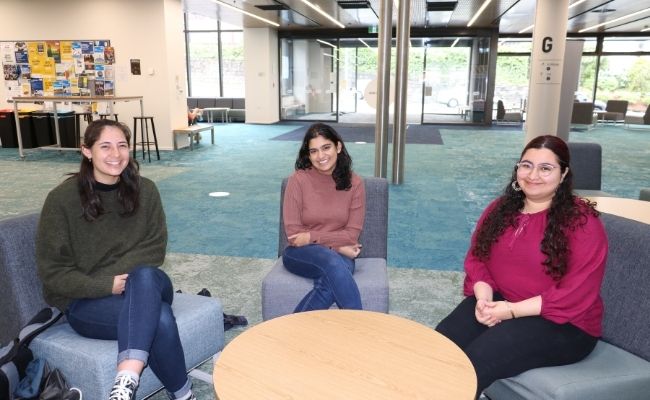
Peer Learning Programmes such as Peer Assisted Study Sessions (PASS) and Peer Assisted Numeracy (PAN) are weekly interactive study sessions aimed at supporting student success, facilitated by second or third-year students.
Students are passing along their knowledge to support others' academic success.
Peer Learning Programmes such as Peer Assisted Study Sessions (PASS) and Peer Assisted Numeracy (PAN) are weekly interactive study sessions aimed at supporting student success, facilitated by second or third-year students. The programmes are offered through the Student Learning Development, part of the University's Higher Education Development Centre.
The PASS programme has been running since 2008 and typically targets papers which are core papers or part of competitive limited entry courses. The PAN programme is in its second year of operation and supports students in the acquisition and mastery of fundamental numeracy concepts necessary for success in first year courses.
Aprille Mincher (Te Aupōuri) has been involved in PASS for seven years, starting as a student in 2015. She then became a PASS facilitator in 2016 and a PASS mentor in 2018.
After completing her Bachelor of Physical Education with Honours in 2018, Aprille began her Bachelor of Medicine and Bachelor of Surgery, and she is now in her third year of the degree.
Aprille's involvement with PASS began as a compulsory component of her first degree.
“Very quickly it became something that I really enjoyed going to. From there it just really snowballed into being able to give back to the group that gave a lot to me,” she says.
With experience as both a PASS facilitator and mentor Aprille has watched many students and facilitators go through the programme. A highlight for her has been watching the facilitators grow into their roles, with their confidence skyrocketing throughout the programme, she says.
“Even though there's been so many people go through the programme there's always been that really strong love for learning and commitment to supporting the students and getting out what's best for them which has been awesome to see.”
Personally, PASS has given Aprille the tools to adapt and be flexible in any situation.
“It's helped me shape my own learning with my own course content. If I'm not getting something I'll think about how I would adapt it in a teaching situation.”
Sixth-year medical student Shreya Bir joined PASS as a student in 2016 and became a facilitator the following year.
Wanting to combat some of her own shyness, Shreya decided to help other students through the programme.
“This is something that I can do for other people. It's great for me because I can revise and hopefully it could help me learn to speak up and become a bit more confident as well.”
Seeing students also grow more confident and experience their “lightbulb moment” has made it a worthwhile experience, she says.
“I think the biggest benefit of PASS is actually in the students' growing self-confidence. A big part of PASS is that we are facilitators and we're there to help but we aren't there to give them the answers. It's a lot of self-empowerment.”
Shreya has won numerous awards for her exceptional facilitation skills at PASS. Students in Shreya's sessions say that she “has been amazing in understanding the needs of her students”, “creates a very safe learning environment” and “always pushes students to reach their full capabilities.”
Shreya's successor in the PASS Health Sciences First Year programme is Parnia Naeimasa who joined PASS as a student because she wasn't staying in a college and therefore she didn't have access to college tutorials.
“For me being able to go to PASS not only meant that I could get help with studies and revising the content but it was more about making new friends and meeting new people. Last year we had the first lockdown and the Zoom sessions, even though they were on Zoom, just having those really meant a lot to me.”
PASS prioritises students who do not reside in the residential colleges and works closely with the Locals programme to ensure equitable access to supplementary study support for all first year students.
This year Parnia became a PAN – Peer Assisted Numeracy facilitator and next year she will be a PAN mentor and PASS facilitator.
Like Aprille, Parnia believes it's important to show reciprocity and give back to the programme that helped her to get into the Bachelor of Medicine and Bachelor of Surgery.
She says she really loves numeracy and mathematics and wants to share that love with other students.
“I really enjoy seeing the moment when a student understands something. It's like a spark in their eyes. It's like eureka, I've found the answer! It's just magical.”
The PAN programme helps to build teamwork skills and supports students to improve confidence by growing their conceptual knowledge of numeracy. Whilst, it provides a safe space to build number sense and overcome math anxiety, Parnia believes the following aspect is also important.
“Like PASS, it's also free and accessible to all students. That's something that is really important to me because I think everyone deserves to have access to education regardless of their background. Everyone is welcome at PAN.”
As a student studying Medicine, Parnia believes PASS and PAN have given her important tools which will help her future career as a doctor.
“As a self-proclaimed introvert I feel like I really needed to push myself and get out of my comfort zone to even apply to be a facilitator. Having been a facilitator this year I feel like it's really helped me develop my interpersonal skills and communication skills.”
The Peer Learning Programmes are research-informed and the academic leaders of the programmes are currently investigating the transferability of professional development training for facilitators in metacognition skills.
Go here to learn more about the Peer Learning Programmes and Student Learning Development services.
Kōrero by Internal Communications Adviser, Chelsea McRae